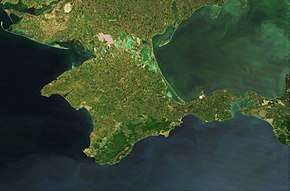Mejlis of the Crimean Tatar People
The Mejlis of the Crimean Tatar People (Crimean Tatar: Къырымтатар Миллий Меджлиси, Qırımtatar Milliy Meclisi; Ukrainian: Меджліс Кримськотатарського Народу, Medzhlis Kryms'kotatars'koho Narodu; Russian: Меджлис крымскотатарского народа, Medzhlis Krymskotatarskogo Naroda) is the single highest executive-representative body of the Crimean Tatars in period between sessions of the Qurultay of the Crimean Tatar People.
| Part of a series on |
| Crimean Tatars |
|---|
 |
| By region or country |
| Religion |
| Languages and dialects |
| History |
| People and groups |
|
| This article is part of a series on the politics and government of Crimea |
 |
|
Republic of Crimea (within Russia) since 2014
Autonomous Republic of Crimea (within Ukraine) |
| See also |
|
Political status of Crimea Politics of Russia Politics of Ukraine |
|
|
The Mejlis is a member institution of the Platform of European Memory and Conscience.
The Mejlis was outlawed by Russia in 2016 for "the use of propaganda of aggression and hatred towards Russia, inciting ethnic nationalism and extremism in society"[2] and listed as an extremist organization[nb 1] two years after the 2014 Russian annexation of Crimea.[3][nb 2] In April 2017 the International Court of Justice delivered its Order on the request for the indication of provisional measures, according to which Russia must lift the ban;[5] Russia has so far failed to comply with this binding decision.[6]
History
The current Mejlis was founded in 1991, to act as a representative body for the Crimean Tatars which could address grievances to the Ukrainian central government, the Crimean government, and international bodies.[7] In its activities Mejlis is subordinated to Qurultai, guided by its decisions, current regulations, the Mejlis of the Crimean Tatar people statute, norms of international law and legislative acts of Ukraine not contradicting with these standards. The main goal of the Mejlis is the liquidation of consequences of genocide conducted by the Soviet state in regard to the Crimean Tatars (Surgun of 1944), reinstatement of national and political rights of the Crimean Tatar people and realization of their rights on the free national state self-determination on its national territory. Mejlis of the Crimean Tatar people consists of 33 members including the Mejlis chair person. Simferopol is the location of Mejlis.
On June 30, 1991, the Mejlis declared its sovereignty over the Crimean Tatars, and adopted the Crimean Tatar's national anthem and national flag.[8] Also, the Crimean Tatars elected 14 Crimean Tatar Deputies to the Verkhovna Rada of Crimea. These 14 deputies were the first Crimean Tatar representatives in the Crimean Parliament in over 50 years.[8]
During the 1998 parliamentary elections members of the Mejlis joined the Rukh election list.[9]
During the 2002, 2006, and 2007 parliamentary elections, members of the Mejlis joined the Our Ukraine election list.[10]
On April 6, 2010, several pro-Russian Crimean political leaders in Crimea demanded the disbanding and banning of the Mejlis and all other forms of political representation for the Crimean Tatars (including the Kurultai), claiming that they were "organized criminal groups and said their activities are unconstitutional."[11] Crimean Tatar organizations urged President Viktor Yanukovych to "protect Crimea's indigenous people from discrimination".[12]
During the 2012 parliamentary elections, members of the Mejlis joined the All-Ukrainian Union "Fatherland" election list.[13] Since 2012, Mejlis is member of the Platform of European Memory and Conscience.
The status of Mejlis was legalized by the Presidential decree of May 18, 1999 "About the council of representatives of Crimean Tatar people".[14][15] In 2010, the President of Ukraine Viktor Yanukovych reformed the council cutting it almost in half and establishing control over it by appointing its members by the President of Ukraine.[16]
From its foundation in 1991 until 2013 its chairman was Mustafa Abdülcemil Qırımoğlu (also known as Mustafa Dzhemilev).[17] Since October 2013 the chairman is Refat Chubarov.[18] The Mejlis's deputy leader is Ilmi Umerov.[19]
On 20 March 2014, two days after the annexation of Crimea by Russia, the Ukrainian parliament officially and explicitly recognized the Mejlis as the executive body of the Qurultay of the Crimean Tatar People, while the Qurultay was recognized as the higher representative body of the Crimean Tatar people.[20] The Ukrainian parliament also recognized the Crimean Tatars as indigenous people of Ukraine.[21]
In March 2014, following the ousting of the Ukrainian president in the 2014 Ukrainian revolution and the subsequent takeover of Crimea by pro-Russian separatists and Russian special forces,[22] local authorities held a referendum on "reunification with Russia", the official result of which was a large majority in support.[23] The Mejlis boycotted the referendum.[24][nb 3] Russia then officially annexed Crimea late March 2014.[26][27] (Ukraine does not recognise the annexation and, backed by most of the international community, continues to assert its right over the peninsula.[4][nb 4]) After the annexation most Mejlis members did not cooperated with the new Russian-Crimean authorities.[28] Of the six members that did one became deputy Crimean parliament speaker and another head of the Crimean state committee for interethnic relations and deported peoples.[28]
In May 2014, Crimean Tatar leader Mustafa Dzhemilev was prevented from entering Crimea, resulting in Crimean Tatars organizing large protests and a failed attempt to help Dzhemilev enter Crimea after Crimean Tatars broke through a border checkpoint. In response, Crimean authorities accused the Mejlis of extremist activity regarding "illegal" gatherings marked by "violence and threats of violence", warning that the Mejlis could be dissolved and outlawed across Russia.[29][30][31]
On 3 July 2014 it was announced that for the first time Mejlis would hold its session outside of Crimea in Henichesk.[32]
Russian law enforcement seized the Mejlis building in Simferopol on 20 September 2014.[1]
The Mejlis was labeled an extremist organisation by Russian authorities in Crimea and banned by the Russian-appointed supreme court there on 26 April 2016.[2] According to Regional Prosecutor General Natalia Poklonskaya, it was banned because its leaders had sought to destabilise Crimea since the 2014 annexation of Crimea by Russia through the use of "propaganda of aggression and hatred towards Russia, inciting ethnic nationalism and extremism in society".[2] The Mejlis was also said to be responsible for stopping all cargo traffic between (mainland) Ukraine and Crimea in the autumn of 2015 and a late November series of explosions that damaged voltage power lines leading to a massive Crimean power outage.[33] The Mejlis denied involvement in these events.[33] (Also on 26 April 2016) Council of Europe's Commissioner for Human Rights Nils Muižnieks urged the court to reverse the ban since he believed "Equating (the Mejlis) with extremism paves the way for stigmatisation and discrimination of a significant part of the Crimean Tatar community and sends a negative message to that community as a whole".[2] Exiled in mainland Ukraine, Chairman of the Mejlis Refat Chubarov stated the court's decision was unjustifiable and that "The occupiers in Crimea are doing everything to crush Crimean Tatars and force everyone to be silent".[2] Amnesty International stated the ban "demolishes one of the few remaining rights of a minority that Russia must protect instead of persecute".[34] Deputy Chairman of the Mejlis Nariman Dzhelal vowed that the organization would try to continue its work despite the ban, saying "it will continue working in Ukraine and other countries".[34]
Deputy head of the Mejlis Ilmi Umerov was on 7 September 2016 released after a three weeks' involuntary detention for tests of his "mental capacity" in a psychiatric hospital in Simferopol (doctors ruled him entirely sane) after stating on TV that Crimea should be returned to Ukraine.[35] Umerov was then charged with calling for Russia's borders to be changed, a charge punishable up to five years in jail.[35]
The Supreme Court of Russia upheld the ban on 29 September 2016.[3] The Mejlis is contesting this ban in the European Court of Human Rights.[36]
On 1 October 2016 (Russian-Crimean government) Head of the Republic of Crimea Sergei Aksyonov explained that Natalia Poklonskaya accused Mejlis in energy blockade through diversion.[37] The same day Aksyonov's Vice-Prime Minister Dmitry Polonsky claimed that Mejlis is a puppet organization of the United States Department of State.[38]
By late December 2016 nine Mejlis members were in mainland Ukraine, in Russia, or in self-imposed exile.[28] One was imprisoned, and more than 10 had been charged with criminal and administrative offences in Crimea.[28]
In April 2017 the UN International Court of Justice made an interim order against the Russian Federation to allow Crimean Tatar Mejlis activities,[39] and in July 2018 reminded Russia of its legal obligation.[40]
See also
Notes
- see List of organisations banned in Russia
- Since the 2014 Crimean crisis, the status of the Crimea and of the city of Sevastopol is under dispute between Russia and Ukraine; Ukraine and the majority of the international community considers the Crimea and Sevastopol an integral part of Ukraine, while Russia, on the other hand, considers the Crimea and Sevastopol an integral part of Russia, with Sevastopol functioning as a federal city (Russian authorities are in control of both).[4]
- The Mejlis also boycotted the 2016 Russian legislative election.[25]
- See: Political status of Crimea.
References
- Crimean Leader Says Mejlis Does Not Exist, Radio Free Europe (22 September 2014)
- Crimean court bans Tatar ruling body in blow to minority, Thestar.com.my (26 April 2016)
- Russia's Supreme Court Upholds Ban On Crimean Tatars' Mejlis, Radio Free Europe (29 September 2016)
- UKRAINE REPORTS RUSSIAN MILITARY ACTIVITY ON CRIMEA BORDER, Newsweek (8 August 2016)
Gutterman, Steve. "Putin signs Crimea treaty, will not seize other Ukraine regions". Reuters.com. Retrieved 26 March 2014.
Ukraine crisis timeline, BBC News
UN General Assembly adopts resolution affirming Ukraine's territorial integrity Archived 2018-03-04 at the Wayback Machine, China Central Television (28 March 2014) - "The Court finds that Russia must refrain from imposing limitations on the ability of the Crimean Tatar community to conserve its representative institutions, including the Mejlis, and ensure the availability of education in the Ukrainian language" (PDF). International Court of Justice. April 19, 2017. Retrieved May 25, 2020.
- "Statement by the Ministry of Foreign Affairs of Ukraine on the human rights situation in temporarily occupied Crimea". Ministry of Foreign Affairs of Ukraine. May 21, 2020. Retrieved May 25, 2020.
- Ziad, Waleed; Laryssa Chomiak (February 20, 2007). "A lesson in stifling violent extremism". Christian Science Monitor. Retrieved March 26, 2007.
- Altan, Mubeyyin Batu (December 1994). "Crimean Tatar Fact Sheet: Chronology". Euronet Internet. Archived from the original on February 4, 2007. Retrieved March 26, 2007.
- "Crimean Tatars and the Ukrainian state: the challenge of politics, the use of law, and the meaning of rhetoric". Iccrimea.org. Retrieved 2014-03-07.
- Ukraine (2003-12-10). "Ukraine". Freedom House. Retrieved 2014-03-07.
- "Pro-Russia Groups Want Crimean Tatar Bodies Disbanded". Rferl.org. 2010-04-06. Retrieved 2014-03-07.
- "Crimean Tatar Groups In Germany Appeal To Ukrainian President". Rferl.org. 2010-05-13. Retrieved 2014-03-07.
- Mustafa Dzhemiliov is number 12 on the list of the United Opposition 'Fatherland', Den (2 August 2012)
- Mustafa Jemilev "the issue of legalization Mejlis was solved by the presidential decree on the establishment of the Council of representatives of Crimean Tatar people" Archived 2014-04-15 at the Wayback Machine. Ukrinform. September 14, 2001
- About the council of representatives of Crimean Tatar people. Presidential decree. May 18, 1999.
- Issue of the council of representatives of Crimean Tatar people. Presidential decree. September 3, 2010
- Regions and territories: Crimea, BBC News
- "Jamestown Foundation: Crimean Tatar Mejlis Elects New Chairperson as Mustafa Cemilev Steps Down; Eurasia Daily Monitor Volume: 10 Issue: 204, 13. November 2013". Retrieved 2014-03-01.
- Astakhova, Olesya (June 1, 2016). "In Crimea, Moscow labels some opponents dangerous Islamists". Reuters. BAKHCHISARAY, Crimea.
- Law of Ukraine. About the Declaration of the Supreme Council of Ukraine on the guarantee of rights of the Crimean Tatar people as part of the Ukrainian State. Verkhovna Rada. March 20, 2014
- Verkhovna Rada recognized the Crimean Tatars the indigenous people of Ukraine. Ukrayinska Pravda. March 20, 2014
- Birnbaum, Michael (15 March 2015). "Putin Details Crimea Takeover Before First Anniversary". Washington Post. Retrieved 11 June 2015.
- "Putin reveals secrets of Russia's Crimea takeover plot". BBC. 9 March 2015. Retrieved 3 August 2016.
- Rapoza, Kenneth (16 March 2014). "As Crimea Secession Vote Passes, Ukraine Restricts Entry By Russians". Forbes. Retrieved 16 March 2014.
- Russian election boycotted by Crimean Tatars, Daily Shaba (20 September 2016)
- Ukraine crisis: Putin signs Russia-Crimea treaty, BBC, 18 March 2014
- "Crimea, Sevastopol officially join Russia as Putin signs final decree". RT. 22 March 2014. Retrieved 9 April 2014.
- A day in the life of Nariman Dzhelyal, Politico (27 December 2016)
- Doloov, Anna. "Authorities Threaten to 'Liquidate' Crimean Tatar Council". The Moscow Times. Retrieved 22 May 2014.
- "Interview: Crimean Tatar Leader Expects Tensions To Rise". Radio Free Europe/Radio Liberty. Retrieved 23 May 2014.
- "Crimean Tatar activists face "extremism" warning". Agence-France Presse. Retrieved 23 May 2014.
- For the first time on Friday Mejlis will meet not in Crimea. Ukrayinska Pravda. 3 July 2014
- Crimean Tatars’ Mejlis may be outlawed for extremism, TASS (16 February 2016)
The Mejlis denies its implication in the blockade of Crimea Archived 2017-09-20 at the Wayback Machine, News from Crimea (17 March 2016) - Crimean court bans 'extremist' Tatar governing body, The Guardian (26 April 2016)
- Russia demands loyalty or silence, say Crimea's hounded Tatars, Yahoo! News (2 October 2016)
- Leader of Crimean Tatar Mejlis who lives in Ukraine confirms plans to go to ECHR, Interfax-Ukraine (30 September 2016)
- Aksyonov does not intend to get distracted by the US Department of States' quirks in relation to the Mejlis' matters (Аксенов не намерен отвлекаться на "выкрутасы" Госдепа в деле по меджлису). RIA Novosti. 1 October 2016
- Crimean authorities explained why the United States do not recognize ban on Mejlis in Russia (Власти Крыма объяснили, почему США не признают запрет меджлиса в России). RIA Novosti. 1 October 2016
- "International Court Of Justice Orders Russia To Allow Crimean Tatar Mejlis Activities, Ensure Availability Of Ukrainian-Language Education In Crimea". ukranews_com. 2017-04-19. Retrieved 2018-11-11.
- "UN Court of Justice: Russia must reinstate Mejlis in Crimea". uawire.org. 2018-07-20. Retrieved 2018-11-11.
External links
- Center of the Information and Documentation of Crimean Tatars — Statute on Mejlis of the Crimean Tatar people (in Russian)
- Official site of Mejlis of the Crimean Tatar People (in Crimean Tatar, Ukrainian, Russian, and English)

